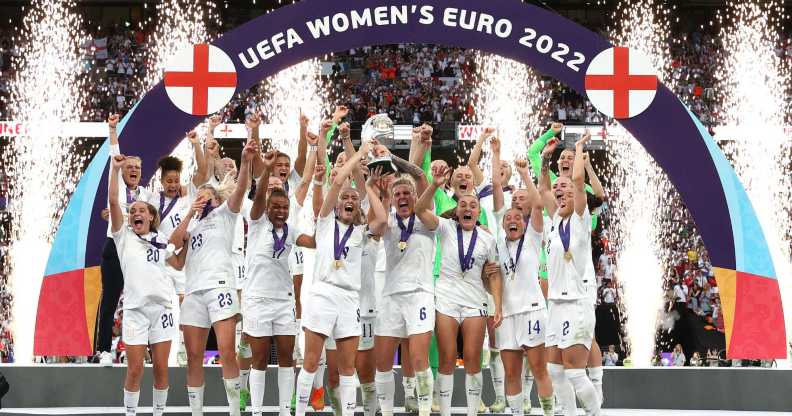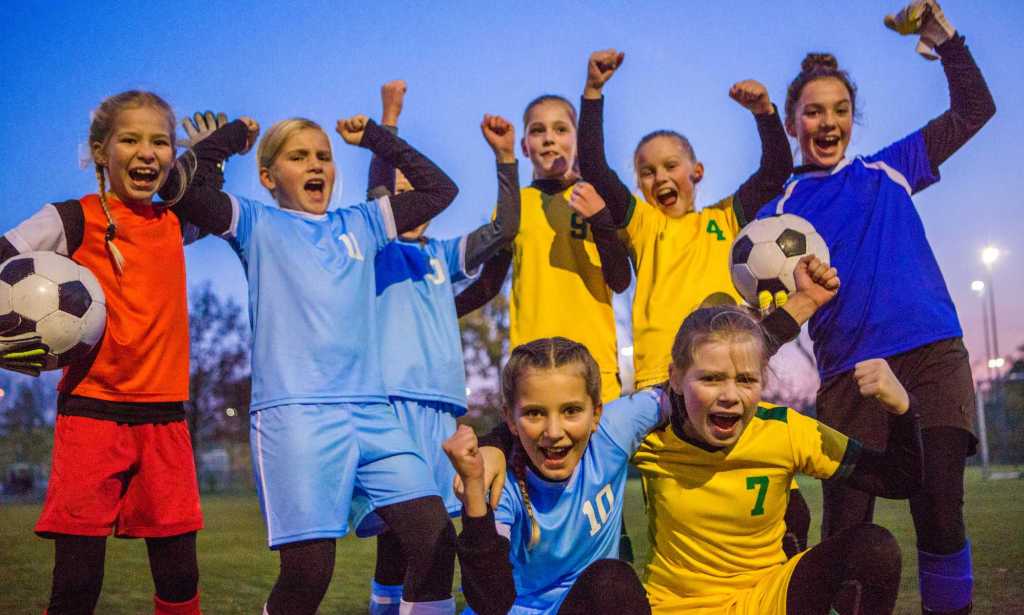Women’s football in England could be ‘billion pound industry’, says chair of major review

The Lionesses brought home England’s their first major senior team trophy in 56 years at the 2022 Euros. (Getty)
Women’s football in England could be a “billion pound industry” within the next decade if given adequate funding and support, the chair of a major independent review into the sport has said.
Former England Lioness turned pundit Karen Carney MBE – who spent her career with Birmingham City, Arsenal and Chelsea – published the 126-page report into the future of women’s domestic football, outlining a number of recommendations to grow the sport at both elite and grassroots levels.
The review, which was was announced in September 2022 by then-culture secretary Nadine Dorries, saw Carney meet with stakeholders from across the game, including current and former players, representatives from organisations across women’s sport, major broadcasters and sponsors.
Some of the 10 major recommendations made by the review panel include making the Women’s Super League and Women’s Championship fully professional with a minimum ‘salary floor’, allowing women’s football to be broadcast during a dedicated slot and urging the FA to address the talent pathway to “create generation after generation of world-beating Lionesses”.
Publication of the report, entitled ‘Raising the Bar – Reframing the Opportunity in Women’s Football’, comes a year on from the Lionesses’ historic Euro 2022 victory, which saw them bring home the first major trophy for an England senior football team in 56 years after a 2-1 victory over Germany.
In an interview with Sky Sports, Carney explained she sees women’s football as a “start-up business” that sponsors, broadcasters and the FA have “a responsibility to invest in” and move the game “to the next level”.
“If you are starting something you have to have an influx of money and I really do believe that in 10 years’ time this sport could be a billion pound industry,” the former midfielder continued.
“But these standards and investment are the foundations that lead us to this point. I really do think we will make it [money] back.”

Other recommendations made by the review include:
- Not settling for anything less than world-leading standards for everyone involved in the women’s game, including players, fans and staff.
- The FA should “urgently” address the lack of diversity across the women’s game, in both on and off-pitch roles.
- Deliver on government commitments to equal access to sport for girls in school.
- Increasing investment to accommodate meaningful access for women and girls to play sport.
- The FA, Premier League and Football Foundation working together to ensure women and girls are benefitting from funding flowing into facilities.
In the report, Carney explained the “central theme” of the review is a need to “lift minimum standards”.
This is particularly noted across four key areas: corporate structures, the professional environment, fan experience, and grassroots.
“The professional environment is, as you might imagine, something which has personal resonance with me,” she wrote. “However, I also believe that it is the area where reforms are most urgently needed.
“Improving the standards that elite players can expect, improving the talent pipeline, and elevating the importance of adequate representation in the women’s game are the foundations from which the sport can go to the next level.”
She went on to say that “meaningful progress” in these areas is “crucial in catalysing the virtuous cycle of investment which can support the organic growth of women’s football”.
Carney said: “As players are nurtured and developed in an increasingly elite performance and welfare environment, on pitch standards will continue to improve, bringing in larger audiences and unlocking new investment from broadcasters and commercial partners.”

In an official statement upon the report’s release, Carney said: “Following the Lionesses’ unforgettable success in 2022 and as we look ahead to the World Cup, it is clear that domestic women’s football has reached a defining moment.
“This review has enabled us to get a comprehensive understanding of the state of the game, and how we can capitalise on the current momentum.
“It is clear that the women’s game in this country can become a world leading sport that not only generates immense economic and social value, but sets the standards for women’s professional sport globally.
“These recommendations must be a blueprint for how this can be achieved, and must be acted upon with urgency.”
Culture Secretary Lucy Frazer said a “milestone” for women’s sport had been reached as the FIFA Women’s World Cup approaches.
She said: “Women’s football in particular has huge potential to improve the lives of women and girls and offer a special and accessible sporting environment for fans.
“Everyone involved in the game must consider the recommendations made in this report and help to take the game to the next level.”
A “unique opportunity” to grow the women’s game
Women in Football (WIF), a network for women in and around the football sector, welcomed the review as an “ambitious vision of the game as a future global leader”.
WIF, who gave evidence to the review, said the organisation was particularly pleased to see Raising the Bar’s recommendations regarding professional players and the football workforce.
Ebru Köksal, chair of Women in Football, noted there is currently a “unique opportunity” to capitalise on the Lionesses’ success and “lay new, strong foundations” for women’s football in this country.
“Women in Football stands ready and willing to continue working with our partners across the game to make sure football delivers on Raising the Bar’s promise of a globally leading game,” she added.
Women in Football CEO Yvonne Harrison said the organisation has taken the lead in supporting women in the game for a number of years and is “delighted” Raising the Bar is as “ambitious as we are for women’s football, and for women’s place in the national game”.
She stated: “We will continue to work through the detail in the document and advocate with the football authorities for the change we all want to see.
“We will shortly be publishing what our own members – women, men and non-binary people working across the game – have told us about their experiences of working in football and this will add to the growing body of detailed, data-based evidence about women’s experiences of the national game.”
A spokesperson for the FA said: “These are exciting times for the development of the women’s game, and we share Karen’s vision of creating world leading standards for players, fans, and everyone involved in women’s football.
“We look forward to working with all stakeholders to address the challenges and opportunities outlined in the report, and to deliver the changes needed to take the women’s professional game to the next level.”
The 2023 FIFA Women’s World Cup gets underway in Australia and New Zealand on Thursday (20 July), with a record number of out LGBTQ+ footballers set to compete at the tournament.
England’s Lionesses will play Haiti in their first Group D match on Saturday (22 July) at 10.30am BST, which will be broadcast live on ITV in the UK.

